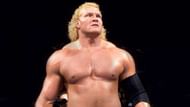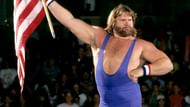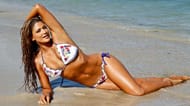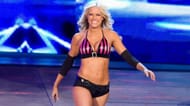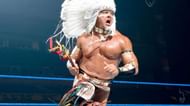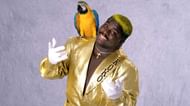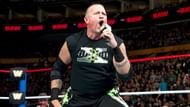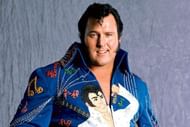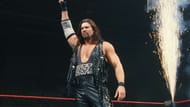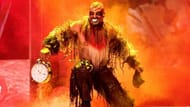Disclaimer: This piece is an opinion of the writer, and does not necessarily represent the views of Sportskeeda.
WWE’s rich history is filled with many great men and women that are known as ‘WWE Legends’. These athletes are considered by WWE to have been critical to WWE’s success over the years, and as such are venerated by today’s commentators and script-writers.
Some people that become legends in WWE truly deserve that honor. The Undertaker, ‘Stone Cold’ Steve Austin, Mick Foley, Bret Hart; these are but a few of the greatest and most influential wrestlers in WWE history. These wrestlers earned the title of ‘legend’ through decades of hard work and immense sacrifice in order to entertain the fans and put on fantastic matches.
WWE has no plans for these former AEW wrestlers? Here's why!
Then there are the more dubious legends. These are people that are not only considered ‘legends’ in terms of their impact on WWE’s history, but are also called ‘legends’ because of their current activities. Some of these ‘legends’ are ambassadors for WWE and act as spokespersons for the company in their day-to-day lives.
It’s this second group that we’ll be looking at in this article. Some of these legends so incredibly over-rated, it makes us wonder how they got the title of ‘WWE Legend’.
#10 Sycho Sid
Sycho Sid is one of a long list of big men that got a push simply because they were so big. In all, Sid spent only five years in WWE, yet somehow that translated into two WWF World Heavyweight Championship reigns.
Sid’s matches at the time weren’t particularly good, unless he was wrestling a true in-ring great like Bret Hart. His promos weren’t that good either, including that one famous botch where he said he has half the brain his opponent did. Nice one, Sid.
Ultimately, Sid will go down in WWE history as a transitional champion who happened to be in WWE as it was undergoing a change in image. His lack of grappling skill and average-at-best promo skills prevented him from becoming a true legend in WWE.
#9 ‘Hacksaw’ Jim Duggan
‘Hacksaw’ Jim Duggan had only a handful of major accomplishments in WWE. He was the first person to ever win a Royal Rumble match, but that was when the match was just a large battle royal and didn’t have any significance otherwise.
Other than that, Duggan didn’t accomplish anything else (Slammy Awards don’t count) – no other titles, no other great distinctions.
His only other ‘achievement’ of note wasn’t a good one: he was busted for drug possession while riding with the Iron Sheik. This made the papers and became an irreparable breaking of kayfabe, one that slowly began the process through which wrestling’s illusions became broken.
So while he might sometimes get a decent reaction for yelling ‘HOOOOOOOOOO’ in one of his surprise appearances, it’s hard to justify Duggan being called a WWE Legend.
#8 Eve Torres
In WWE-speak, the term ‘WWE Legend’ is used sometimes to describe a non-wrestler working for WWE in a public-relations capacity, also known as a ‘WWE Ambassador’. These two terms are used interchangeably, which means that ‘WWE Ambassadors’ are used to describe ‘WWE Legends’ and vice-versa.
This means that Eve Torres is, by this definition, a WWE Legend.
Eve was a prime example of the ‘Divas’ presentation WWE promoted during the late 2000s and early 2010s. Though she had more grappling ability than some of her peers at the time, this was overshadowed by the kinds of things she did as a ‘Diva’, including shaking her rear before executing a Moonsault.
Given how WWE is generally moving away from the ‘Divas’ name and style, it’s ironic that a three-time Divas Champion is an Ambassador/Legend according to their own website.
#7 Kelly Kelly
Another example of WWE employing previous wrestlers as Ambassadors/Legends, Kelly Kelly was one of the worst examples of WWE’s dubious treatment towards women during the mid-2000s. She was introduced as an exhibitionist and spent more time doing non-wrestling-related acts than actually wrestling for many years.
She won the Divas Championship in 2011 but didn’t really improve as a performer. Her wrestling style was very much below that of many of her peers at the time, both male and female. It was odd seeing her at the top of the division, especially since WWE was grooming others to take her place.
Kelly’s status as a WWE Legend/Ambassador is highly dubious, given what she represented to WWE during one of its darker periods vis-à-vis presentation of women’s wrestlers.
#6 Tatanka
When you’re looking to make someone into a WWE Legend, i.e. someone that can promote the company to the public, it would make sense to use someone who could act as a great success story based on their own accomplishments in that company.
Tatanka was not one of those people.
Tatanka’s WWE career wasn’t one worthy of being called a WWE Legend. He spent the majority in undercard and mid-card matches and rarely got any major title shots. His career during the mid-1990s wasn’t particularly impressive, and his return a decade later didn’t yield any major results, either.
Ultimately, the decision to make Tatanka into a WWE Legend should be treated with scepticism. His WWE career was bereft of any exceptional moments, so why is he being honoured with a title befitting someone with a legendary career?
#5 Koko B. Ware
If there was ever an entry that questioned the legitimacy of the WWE Hall of Fame, it was Koko B. Ware. Inducted as part of the class of 2009, Koko’s accomplishments in WWE were threadbare. He had spent virtually his entire career as a jobber and lower-card athlete, having done nothing major of note.
While his WWE career was historic in the sense that he took part in the first-ever match on WWE RAW, that could’ve easily gone to any other wrestler at the time. That Koko got that honour just happened to be due to the booking of the show on that date.
Yet Ware is considered someone worthy of a WWE Hall of Fame induction, whereas so many other, more historically-significant wrestlers still haven’t been inducted.
#4 Road Dogg
On one hand, Road Dogg has proven to be a good booker and producer, as seen with his involvement in SmackDown Live’s success during the second half of 2016 and first quarter of 2017. But this list also takes into account wrestling ability, which is something that Road Dogg had… in average quantities.
As an entertainer, Road Dogg was actually quite good, but his in-ring skills weren’t really awe-inspiring. His signature moves were more flash than substance, and many of them (including the Shake, Rattle ‘N’ Roll) reeked of phoniness.
Add to this a finishing move that involved Road Dogg dry-humping his opponent before executing it and you’ve got a guy that made you wonder how he could ever have won so many Tag Team Championships.
#3 The Honky Tonk Man
When looking at the Honky Tonk Man for the first time, you’d find it hard to believe this guy was a believable pro wrestler. Even in his prime, Honky lacked the physique of a true pro wrestler, looking more lanky and thin than he did muscularly.
His grappling ability wasn’t the best either, as his offence looked phoney and his selling was at times over-dramatic.
Yet this man somehow still holds the record for longest-ever WWE Intercontinental Championship reign. Moreover, when he does make a handful of appearances, he’s considered a legend of the wrestling business by WWE.
One cannot help but wonder if he would’ve had the same degree of success if he wasn’t Jerry Lawler’s cousin.
#2 Kevin Nash
From a purely business-related standpoint, Kevin Nash was one of the most influential forces in wrestling history. He was instrumental in the formation of both the Kliq and the New World Order, and also took part in many high-profile feuds and moments in both WWE and WCW (including the infamous Curtain Call incident).
From a wrestling perspective, however, it’s a different story. Nash has never been the best of grapplers, and was a prime example of Vince McMahon’s love of athletes with superhuman physiques. This helped Nash make himself look like a superstar, but it didn’t help him in the ring.
Nash rarely had any truly great matches and was very limited as an athlete. In fact, his WWE Championship reign during the mid-1990s marked one of the lowest points in WWE history because fans didn’t like him as a wrestler.
Yet nowadays, he’s considered a WWE Legend, despite not being particularly relevant since 2002 (let’s ignore that mistake that was Nash’s feud with Triple H in 2011). Perhaps he became a ‘Legend’ simply because he’s an excellent businessman as opposed to being a fantastic wrestler.
#1 The Boogeyman
It might be hard to believe, but the Boogeyman is actually a WWE Legend. This became the case when he signed a Legends contract in November 2015. As per the stipulations of this contract, the Boogeyman doesn’t make wrestling-related appearances, for the most part, only getting in the ring on the rare occasion.
I have no idea what the Boogeyman did to deserve being signed to such a contract. He was a flash-in-the-pan gimmick during the mid-2000s, one whose novelty wore off very quickly. His in-ring ability has always been extremely limited, which is to be expected for someone debuting at age 40 (unless your name it Fit Finlay).
The Boogeyman has always been disappointing and his significance to WWE is threadbare. With so many bigger and more high-profile WWE alumni out there, one cannot help but wonder why the Boogeyman is a WWE Legend.
How WWE has messed up John Cena's last run - Check here!
